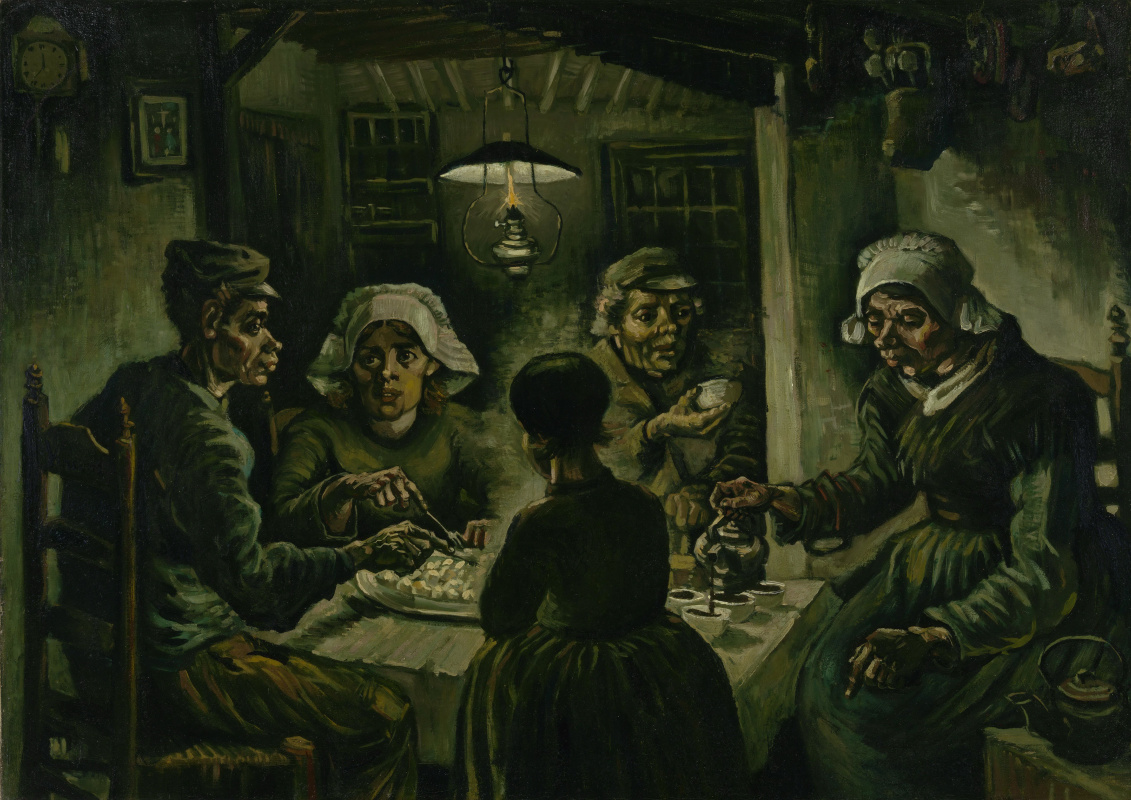log in
Enter site
Login to use Arthive functionality to the maximum
The potato eaters
Vincent van Gogh • Malerei, Mai 1885, 81×114 cm
Bildbeschreibung «The potato eaters»
In the winter of 1885 Vincent lives in his parents ' home in the small town of Nuenen. He quite spoiled the relationship with the father, the parents are constantly reproach its lack of earnings and the desire to get a lucrative job. But van Gogh here appears for the first time a private Studio set in the former Laundry room behind my parents ' house. Most good people look at Nuenen Vincent down, someone at the meeting in disgust gives him only one finger instead of open palm.
Winter could not improve the mood of the artist, every day surround and surround yourself all over the wall of solitude. Landscapes Nuenen, and without that not too picturesque and joyful, become very bleak. Vincent sees around only dirt, some places covered with miserable scraps of snow, black branches of trees and dry grass. But van Gogh does not allow himself to fully immerse in a black melancholy, and begins to paint portraits of peasants, and planning over the winter to create 50 paintings. He moves with such zeal that in only a month says three dozen paintings. Later the heads of the peasants will become the basis for his first notable work – "The potato eaters".
Poor family, depicted van Gogh, dinner with a weak light bulb, potatoes and coffee. And it is unlikely that this meal is too different from many previous and subsequent. Poor decoration of the house, dark colors and rough the faces of the characters in the movie produced dismal. But this is exactly what Vincent wanted. In a letter to his brother Theo, he wrote: "The whole winter I kept the thread of the future of the fabric and picked up a distinctive pattern, and although the fabric I got at the raw and rough, the threads were selected carefully and in accordance with defined rules. It is possible that I went a real peasant painting. He who prefers to see the peasants sugary, let him think what he wants. I am personally convinced that will achieve the best results, depicting the story in all its brutality than trying to give him a conditional grace".
Author: Eugene Sidelnikov
Winter could not improve the mood of the artist, every day surround and surround yourself all over the wall of solitude. Landscapes Nuenen, and without that not too picturesque and joyful, become very bleak. Vincent sees around only dirt, some places covered with miserable scraps of snow, black branches of trees and dry grass. But van Gogh does not allow himself to fully immerse in a black melancholy, and begins to paint portraits of peasants, and planning over the winter to create 50 paintings. He moves with such zeal that in only a month says three dozen paintings. Later the heads of the peasants will become the basis for his first notable work – "The potato eaters".
Poor family, depicted van Gogh, dinner with a weak light bulb, potatoes and coffee. And it is unlikely that this meal is too different from many previous and subsequent. Poor decoration of the house, dark colors and rough the faces of the characters in the movie produced dismal. But this is exactly what Vincent wanted. In a letter to his brother Theo, he wrote: "The whole winter I kept the thread of the future of the fabric and picked up a distinctive pattern, and although the fabric I got at the raw and rough, the threads were selected carefully and in accordance with defined rules. It is possible that I went a real peasant painting. He who prefers to see the peasants sugary, let him think what he wants. I am personally convinced that will achieve the best results, depicting the story in all its brutality than trying to give him a conditional grace".
Author: Eugene Sidelnikov


